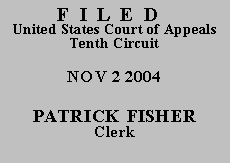

| JAMES JOSEPH OWENS-EL, |
|
| v. | |
| ROBIN A. HOOD, Warden, |
Applicant's principal argument appears to be that the remedy provided in 28 U.S.C. § 2255 is inadequate or ineffective because he has been denied relief under that theory. He further asserts that he should be allowed to bring his claim under § 2241 because he is prohibited from filing a second or successive § 2255 application in the sentencing court. These arguments lack merit.
"Failure to obtain relief under § 2255 does not establish that the remedy so provided is either inadequate or ineffective." Williams v. United States, 323 F.2d 672, 673 (10th Cir. 1963) (internal quotation marks omitted). Nor does the fact that Applicant is procedurally barred from filing a second or successive § 2255 application. See Caravalho v. Pugh, 177 F.3d 1177, 1179 (10th Cir. 1999).
Applicant also claims he is actually innocent because one or more juvenile convictions that were used to enhance his federal sentence have since been vacated. The district court ruled that these facts do not render § 2255 inadequate or ineffective. Section 2255 specifically allows a second or successive motion in the sentencing court based on "newly discovered evidence that, if proven and viewed in light of the evidence as a whole, would be sufficient to establish by clear and convincing evidence that no reasonable factfinder would have found the movant guilty of the offense." 28 U.S.C. § 2255. As we have previously instructed, Applicant's appropriate avenue of relief is through 28 U.S.C. § 2255 in the sentencing court, and his "dissatisfaction with the results he has obtained in the sentencing court[] does not establish that 2255 was an inadequate or ineffective remedy." Owens v. Story, No. 95-1367, 1995 WL 745962, at *1 (10th Cir. Dec. 15, 1995); see also Owens v. Pugh, 1999 WL 682895, at *1 (10th Cir. Sept. 2, 1999).
For substantially the same reasons set forth in the district court's June 17, 2004, Order and Judgment, we AFFIRM the judgment below. Finding no "reasoned, nonfrivolous argument on the law and facts in support of the issues raised," DeBardeleben v. Quinlan, 937 F.2d 502, 505 (10th Cir. 1991), we also deny Applicant's motion to proceed in forma pauperis. To the extent that Applicant's "Affidavit & Memorandum Pursuant to the Penalties for Perjury," filed on October 26, 2004, seeks appointment of counsel or any other relief, it is
denied.
ENTERED FOR THE COURT
Harris L Hartz
Circuit Judge
*.After examining the briefs and appellate record, this panel has determined unanimously that oral argument would not materially assist the determination of this appeal. See Fed. R. App. P. 34(a)(2); 10th Cir. R. 34.1(G). The case is therefore ordered submitted without oral argument. This order and judgment is not binding precedent, except under the doctrines of law of the case, res judicata, and collateral estoppel. The court generally disfavors the citation of orders and judgments; nevertheless, an order and judgment may be cited under the terms and conditions of 10th Cir. R. 36.3.